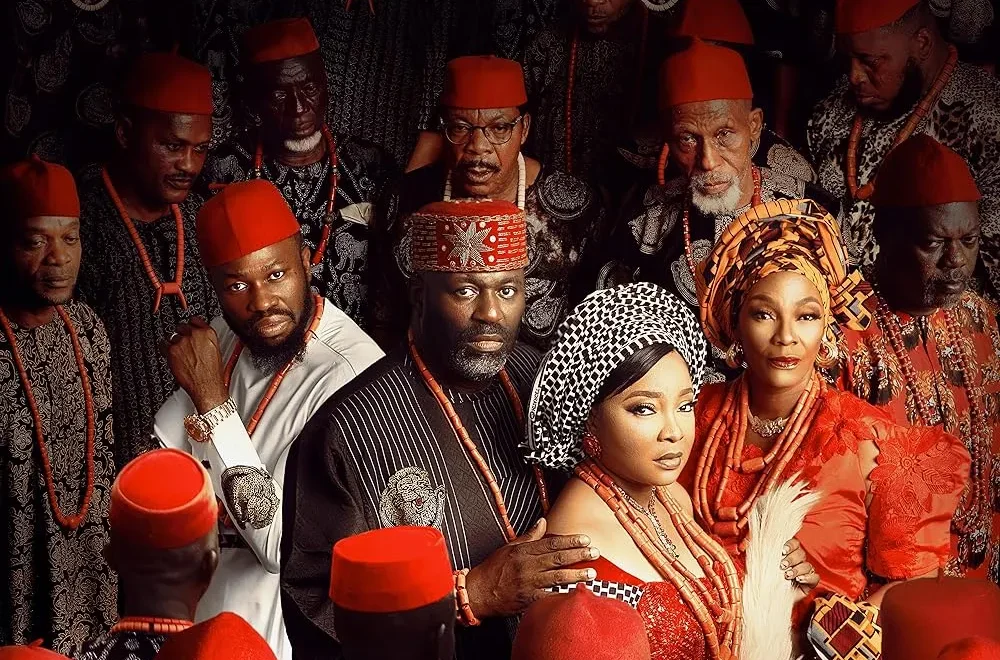If The Serpent’s Gift had one lesson for Nollywood, it would be that cultural truth requires more than surface markers.
By Joseph Jonathan
Films do something blunt and unavoidable: they teach. Every shot, every costume, and cut either bolsters an image the world already carries about a people or complicates it. The Serpent’s Gift, directed by Kayode Kasum, signals an ambition to do the latter — to interrogate widowhood, wealth, and inheritance in a contemporary Igbo setting. Too often, though, it takes the cheaper route.
At its core, The Serpent’s Gift is straightforward: Nduka Sylvanus (Chico Aligwekwe), a wealthy businessman, dies suddenly; his young widow Ijeoma (Linda Ejiofor-Suleiman) finds herself under siege from relatives hungry for control of his empire.
That premise, inheritance as battlefield, widowhood as vulnerability, has strong dramatic potential. But the film’s recurring error is a dramaturgical one: it treats certain customs as if they were the default script for contemporary Igbo culture, deploying them for maximum emotional jolt rather than interrogating their place in modern social practice.

Let’s be specific. The Serpent’s Gift repeatedly foregrounds widowhood rituals — the forced ceremonial walk, the insistence that Ijeoma drink the water used to bathe her late husband — and stages them as though they are normative in South-East Nigeria today.
That choice reads like sensationalism disguised as ethnography. If you want the audience to understand why such practices persist (despite the fact that they hardly do nowadays), you show the debates, resistances, compromises, and legal or civic contexts that shape them. Instead, these rituals float in the frame as spectacle: dramatic curiosities to be watched, not social problems to be understood.
That tendency toward spectacle is compounded by sloppy world-building. Remove the language, and nothing about The Serpent’s Gift feels specifically Igbo. This isn’t a throwaway grievance — it’s the film’s central, damning weakness. The screenplay peppers dialogue with proverbs and local phrases, but the mise-en-scène often contradicts the claims of cultural specificity.
There are moments so incongruous they yank viewers out of the drama: a wealthy businessman’s office decorated with the faces of national politicians who, in context, make no sense; an Ibadan branch of Nduka’s company where all the characters default to Igbo instead of English or a believable hybrid of Yoruba, Igbo and English; and, conversely, there are scenes set in Igbo contexts where the characters oddly switch to English.
Even the funeral of a titled man is staged like an afterthought rather than the elaborate social event it should be. These are not minor slips. They signal a lack of scrutiny and research that makes the film feel like a pastiche — an image of Igbo-ness assembled from familiar icons rather than a living, internally consistent world.
Why does this matter? Because when a film claims cultural authenticity but fails to get the small things right, it invites two harms.
First, it exoticises: audiences unfamiliar with Igbo culture will take these dramatised anomalies as normal practice. Second, it erodes trust among the community depicted. A scene that treats a titled man’s burial as underwhelming — when, by social and cultural expectation, such a burial would be elaborate, public and ritualised — doesn’t simply misread detail; it shrinks the stakes.
If the director wants us to grieve the loss of a man whose wealth will evaporate into the hands of the wrong custodian, the funeral sequence should affirm why that loss matters socially and symbolically. Here it does not.

Small details earn large consequences. The decision to have Ijeoma relay the news of her husband’s death to the family via conference call — with none of them present at the hospital during Nduka’s final moments — strains credibility. In many Igbo communities, illness and death are communal events with kinship obligations that mobilise the extended family.
Yes, the film suggests that Nduka hid his terminal illness, which could explain why relatives were absent. But even secrecy has limits: sudden hospitalisation or end-of-life care would typically trigger communal intervention, whether through family networks, business associates, or community elders.
By presenting absolute isolation as an unquestioned fact, the film bypasses the very tension it needed to dramatise — the clash between a man’s desire for privacy and a culture’s insistence on communal presence. That clash could have enriched the story; instead, we are left with a thin shorthand that weakens emotional stakes.
Performances, to the film’s credit, keep it watchable even when the script and world-building falter. Linda Ejiofor-Suleiman is the film’s moral gravity: she finds the narrow seam between resolute anger and brittle grief and carries the film through its less credible stretches. Her Ijeoma is not simply victimhood in motion; she’s a woman negotiating a public claim to legacy with private sorrow.
Tina Mba’s Margaret gives the film its sharp, antagonistic edge — a matriarch, who at times feels deliberately overdrawn, but whose presence grounds the familial friction. Stan Nze’s Nonso, by contrast, often flirts with broadness; his greed is readable, but it lacks the textured human desperation that would have made him more than an archetype.
The screenplay (credited to Stephen Okonkwo and Ufuoma Metitiri) is a mixed bag. It nails cadences and the rhythm of local speech in places, and some lines resonate with the weight of oral tradition. Yet, the script is reluctant to interrogate the practices it stages.
Instead of dramatising the legal, economic, and moral mechanisms that sustain certain rituals — the role of title societies, the influence of patriarchal inheritance laws, the social sanctions that enforce conformity — the film lingers on performative acts of humiliation. That’s a storytelling choice with consequences: the viewer learns what happens but never why it still happens, or how it is contested.
Technically, The Serpent’s Gift does offer some pleasure. The cinematography captures the South-East’s green pulse; there are moments of visual lyricism that suggest a respect for place.

The soundtrack, steeped in Igbo highlife motifs, works as an affective tether to a Nollywood lineage that can be both nostalgic and invigorating. Those formal strengths make the film’s missteps more disappointing: they show the crew had the tools to render a complex cultural portrait, but chose spectacle over nuance.
If The Serpent’s Gift had one lesson for Nollywood, it would be that cultural truth requires more than surface markers. Accuracy is not only about avoiding factual error; it is about showing social texture — the disputes, the negotiations, the everyday resistances that exist inside any living culture. To dramatise widowhood without showing its contested status in modern life is to flatten a subject that deserves interrogation.
In the end, The Serpent’s Gift oscillates between two impulses: to honour and to capitalise. It wants to ask hard questions about legacy, gender, and wealth in contemporary Igbo society, and yet it keeps stepping onto a stage built of tropes that simplify its subjects for dramatic effect. Instead of deepening our understanding, the film rehearses stereotypes. And that is the most disappointing lesson it leaves behind.
Rating: 1.9/5
Joseph Jonathan is a historian who seeks to understand how film shapes our cultural identity as a people. He believes that history is more about the future than the past. When he’s not writing about film, you can catch him listening to music or discussing politics. He tweets @Chukwu2big.



